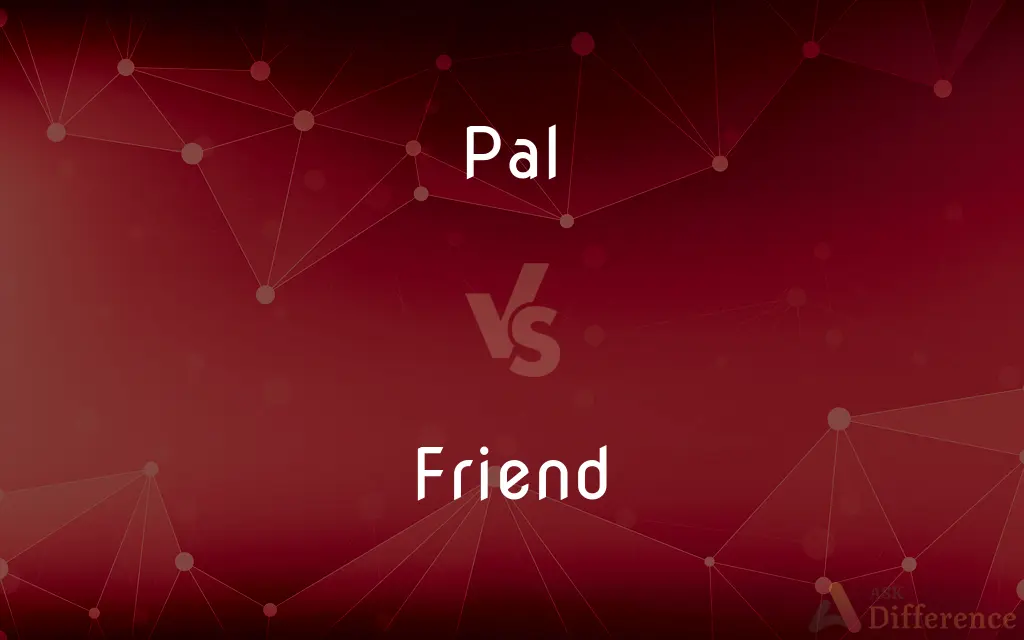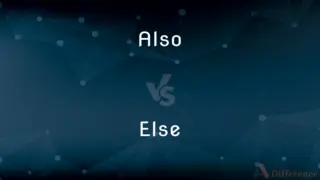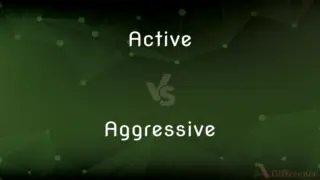Pal vs. Friend — What's the Difference?
By Tayyaba Rehman & Fiza Rafique — Updated on March 7, 2024
A pal is often seen as a casual or informal buddy, mainly used for someone you're friendly with in a relaxed context, whereas a friend denotes a deeper, more significant bond involving mutual affection and support.

Difference Between Pal and Friend
Table of Contents
ADVERTISEMENT
Key Differences
A pal is typically considered a companion or an associate with whom one shares a casual relationship, often used in contexts where the friendship is based on shared activities or interests. On the other hand, a friend is understood to represent a stronger, more profound connection that encompasses emotional support, trust, and a wide range of shared experiences over time.
The term "pal" is sometimes used in a slightly more casual and sometimes temporary context, suggesting a level of friendship that may not involve deep emotional connections. Whereas, "friend" implies a level of intimacy and a sense of a lasting bond, suggesting that the individuals care deeply about each other's well-being and happiness.
In colloquial use, "pal" can sometimes carry a more masculine connotation or be used in a more lighthearted manner, suggesting a buddy or a mate with whom one might share specific interests or activities. Conversely, "friend" is gender-neutral and universally applicable, carrying no specific connotations related to the nature of the activities shared between the individuals.
The choice between using "pal" or "friend" can also reflect the speaker's cultural background or the formality of the situation. "Pal" might be preferred in more informal settings or within certain dialects or cultural groups, while "friend" is universally understood and used across various contexts and cultures.
While "pal" might be more commonly used in certain phrases or idioms, indicating a friendly but not necessarily close relationship, "friend" is often seen in contexts that emphasize emotional support, such as in the concept of a "best friend," which denotes a primary, close, and enduring friendship.
ADVERTISEMENT
Comparison Chart
Connotation
Casual, informal
Deep, emotional bond
Emotional Depth
Generally superficial or limited
Significant and profound
Context
Often used for companions in specific activities
Used universally for various levels of closeness
Durability
Can be temporary or based on shared activities
Implies a lasting, enduring connection
Cultural Usage
Might vary by region; more informal
Universal; transcends cultures and formalities
Compare with Definitions
Pal
Someone you hang out with occasionally.
We're not close, but he's a good pal for movies.
Friend
A person with whom one has a bond of mutual affection.
My best friend and I share everything.
Pal
A casual acquaintance or friend.
I'm going hiking with a pal from work.
Friend
Someone who supports a cause, group, or country.
She's been a friend to the environmental movement for years.
Pal
An ally or companion in a specific context.
She's my gym pal, we motivate each other.
Friend
A companion who is not related by blood or marriage.
Childhood friends can become like family.
Pal
A mate or buddy with whom you share interests.
My chess pals meet every Thursday.
Friend
Someone you trust and support.
A true friend is there for you in times of need.
Pal
A term of friendly address, especially among men.
Hey pal, could you pass me the wrench?
Friend
A person who is on good terms with another.
I'm glad we're friends, despite our past differences.
Pal
A friend; a chum.
Friend
A person whom one knows, likes, and trusts.
Pal
To associate as friends or chums. Often used with around.
Friend
A person whom one knows; an acquaintance.
Pal
(colloquial) A friend, buddy, mate, cobber; someone to hang around with.
Little Timmy's out playing with his pals.
Friend
A person with whom one is allied in a struggle or cause; a comrade.
Pal
(colloquial) An informal term of address, often used ironically in a hostile way.
Don't you threaten me, pal – I'll report you to the police.
Friend
One who supports, sympathizes with, or patronizes a group, cause, or movement
Friends of the clean air movement.
Pal
(slang) Be friends with, hang around with.
John plans to pal around with Joe today.
Friend
Friend A member of the Society of Friends; a Quaker.
Pal
A mate; a partner; esp., an accomplice or confederate.
Friend
(Informal) To add (someone) as a friend on a social networking website.
Pal
A close friend who accompanies his buddies in their activities
Friend
(Archaic) To befriend.
Pal
Become friends; act friendly towards
Friend
A person, typically someone other than a family member, spouse or lover, whose company one enjoys and towards whom one feels affection.
John and I have been friends ever since we were roommates at college.
Trust is important between friends.
I used to find it hard to make friends when I was shy.
We became friends in the war and remain friends to this day.
We were friends with some girls from the other school and stayed friends with them.
Friend
An associate who provides assistance.
The Automobile Association is every motorist's friend.
The police is every law-abiding citizen's friend.
Friend
A person with whom one is vaguely or indirectly acquainted.
A friend of a friend;
I added him as a friend on Facebook, but I hardly know
Friend
A person who backs or supports something.
I’m not a friend of cheap wine.
Friend
(informal) An object or idea that can be used for good.
Fruit is your friend.
Friend
Used as a form of address when warning someone.
You’d better watch it, friend.
Friend
(object-oriented programming) A function or class granted special access to the private and protected members of another class.
Friend
(climbing) A spring-loaded camming device.
Friend
(euphemistic) A lover; a boyfriend or girlfriend.
Friend
To act as a friend to, to befriend; to be friendly to, to help.
Friend
(transitive) To add (a person) to a list of friends on a social networking site; to officially designate (someone) as a friend.
Friend
One who entertains for another such sentiments of esteem, respect, and affection that he seeks his society and welfare; a wellwisher; an intimate associate; sometimes, an attendant.
Want gives to know the flatterer from the friend.
A friend that sticketh closer than a brother.
Friend
One not inimical or hostile; one not a foe or enemy; also, one of the same nation, party, kin, etc., whose friendly feelings may be assumed. The word is some times used as a term of friendly address.
Friend, how camest thou in hither?
Friend
One who looks propitiously on a cause, an institution, a project, and the like; a favorer; a promoter; as, a friend to commerce, to poetry, to an institution.
Friend
One of a religious sect characterized by disuse of outward rites and an ordained ministry, by simplicity of dress and speech, and esp. by opposition to war and a desire to live at peace with all men. They are popularly called Quakers.
America was first visited by Friends in 1656.
Friend
To act as the friend of; to favor; to countenance; to befriend.
Fortune friends the bold.
Friend
A person you know well and regard with affection and trust;
He was my best friend at the university
Friend
An associate who provides assistance;
He's a good ally in fight
They were friends of the workers
Friend
A person with whom you are acquainted;
I have trouble remembering the names of all my acquaintances
We are friends of the family
Friend
A person who backs a politician or a team etc.;
All their supporters came out for the game
They are friends of the library
Friend
A member of the Religious Society of Friends founded by George Fox (the Friends have never called themselves Quakers)
Common Curiosities
Can family members be considered friends?
Yes, family members can also be considered friends if they share a bond of mutual affection beyond familial obligations.
Does the term "friend" carry the same meaning in all cultures?
While "friend" is a universally recognized term, its nuances and expectations can vary across different cultures.
Is it easier to make pals or friends?
Generally, it's easier to make pals due to the less intensive emotional investment required.
Can workplace relationships be classified as pals or friends?
Yes, workplace relationships can range from pals (casual) to friends (close), depending on the depth of the connection.
Can a pal become a friend?
Yes, a pal can develop into a friend as the relationship deepens and becomes more emotionally connected.
Can someone have more pals than friends?
Yes, it's common to have more pals, or casual buddies, than close friends due to the different levels of emotional investment required.
Are friends always humans?
In general, "friend" refers to human relationships, but it can also describe close bonds with pets or animals.
Is it common to use "pal" in formal contexts?
Typically, "pal" is used in more informal contexts, whereas "friend" can be used in both informal and formal settings.
Can the term "friend" imply different levels of closeness?
Yes, "friend" can denote various levels of closeness, from acquaintances to best friends.
Is "pal" gender-specific?
While "pal" is often seen as more masculine, it's not exclusively used for males.
How does social media affect the definition of "friend"?
Social media has broadened the definition, often including people with whom one might not share a deep emotional connection.
How does one transition from being a pal to a friend?
The transition involves increased personal sharing, trust, and mutual support over time.
Do children understand the difference between a pal and a friend?
Children might not grasp the subtle distinctions but understand the concept of varying levels of closeness.
Is it possible to have an online friend or pal?
Yes, online relationships can form both pals and friends, depending on the level of emotional connection.
What is more valuable, having many pals or a few close friends?
This depends on personal preference and life stage, but many find a few close friends to be more valuable for emotional support and depth of connection.
Share Your Discovery

Previous Comparison
Also vs. Else
Next Comparison
Active vs. AggressiveAuthor Spotlight
Written by
Tayyaba RehmanTayyaba Rehman is a distinguished writer, currently serving as a primary contributor to askdifference.com. As a researcher in semantics and etymology, Tayyaba's passion for the complexity of languages and their distinctions has found a perfect home on the platform. Tayyaba delves into the intricacies of language, distinguishing between commonly confused words and phrases, thereby providing clarity for readers worldwide.
Co-written by
Fiza RafiqueFiza Rafique is a skilled content writer at AskDifference.com, where she meticulously refines and enhances written pieces. Drawing from her vast editorial expertise, Fiza ensures clarity, accuracy, and precision in every article. Passionate about language, she continually seeks to elevate the quality of content for readers worldwide.














































